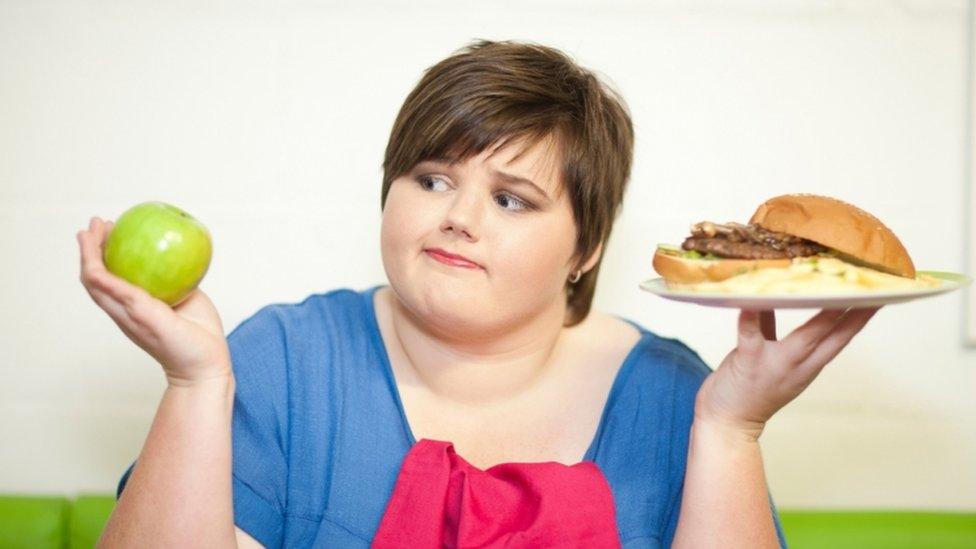'Unpopular' steps needed to cut obesity
- Published

The committee said unhealthy food was too easily available and too heavily promoted in Scotland
Scotland may need to introduce unpopular policies as part of a bold approach to tackling the country's obesity problem, according to MSPs.
Holyrood's health committee said measures such as restricting cars in towns and increasing parking charges would be politically unpopular.
But they said the policies could also encourage people to be more active.
Almost two thirds (65%) of adults in Scotland were overweight in 2015, including 29% who were obese.
Meanwhile, 28% of children were at risk of becoming overweight, with 15% at risk of obesity.
'Health inequalities'
Committee members also urged the Scottish government to consider whether regulations could be brought in which would prevent retailers promoting foods that are bad for health.
The committee is currently considering if it could bring forward its own legislative proposals to tackle the problem.
In a letter to Public Health Minister Aileen Campbell, the committee said: "We support a bold approach to the new obesity strategy and would encourage you to include options that may initially be unpopular as this could result in an important step towards balancing out health inequalities in Scotland."
The committee highlighted the "obesogenic environment in Scotland", where unhealthy food is "more available and more heavily promoted than in other countries".
Two fifths of adults do not do enough exercise to meet guidelines, it added, with MSPs also pointing to a food culture of people eating together less, and snacking more.
And it said poverty forces some shoppers to opt for high calorie choices instead of healthier options.

Two thirds of adults in Scotland are classed as being overweight
While the MSPs said "good policies" had been brought in to tackle the obesity problem, they added they were "not necessarily translating into healthy outcomes".
They said: "The main reason given for this was an inconsistent approach to resourcing the policies and frameworks. This resulted in successful policies not being scaled up or stopped altogether."
Ms Campbell was pressed on whether the government would restore its funding for the Jogscotland initiative, external, which the committee said had been "particularly successful in encouraging women to undertake more physical activity".
The committee also suggested money may need to be ring-fenced to fund projects when a new obesity strategy is introduced.
'No easy fix'
The MSPs said: "We understand interventions cost money but believe preventative spend must be looked at seriously by the Scottish government.
"The initial outlay would seem to be outweighed by the ultimate cost savings to the NHS, employers, and local authorities.
"All the above show there is no easy fix for tackling obesity in Scotland and a comprehensive long term, cross-portfolio approach will be required."
Committee convenor Neil Findlay said it was disappointing that the "good policies" put in place to tackle obesity by the Scottish government "don't seem to be working".
The Labour MSP added: "Scotland has not previously been afraid to take the initiative to tackle health related issues when other interventions have failed. This is why this committee is asking for a bold approach to tackling obesity.
"If we don't act now, we will be condemning future generations to a lifetime of poor health which is often driven by poverty leading to poor dietary choices."
'Healthy choice'
Responding to the committee's letter, Ms Campbell said: "We have consistently called on the UK government to ban junk food advertising before the 9pm watershed.
"And we are looking at what further effective actions we can take within the powers available to us, including the use of multi-buy promotions, as well as examining a range of actions to improve diet, physical activity and education.
"We have announced our intention to set out and consult on the development of our new diet and obesity strategy this year, building on our wide range of activity to make it easier for people - including children and their families - to be more active, eat less, and eat better."
Obesity Action Scotland supported the committee's conclusions on tackling price promotions of unhealthy food.
Supermarket promotions
Programme lead Lorraine Tulloch said: "We know that price promotions lead us to buy more than we intended and consume more than we intended.
"We need to ensure that the healthy choice is the easy choice for everyone."
It was also backed by consumer group Which? Its director of campaigns and communications, Vickie Sherriff, said: "Our research has shown that people in Scotland would like to eat more healthily but it's the less healthy options that are more likely to be included in supermarket promotions.
"Retailers have to be more responsible with the type of products they include in their offers.
"To help tackle the obesity crisis the Scottish government has to do more to ensure food manufacturers and retailers make their promotions more responsible and commit to targets to reduce their sugar, salt and saturated fat levels."